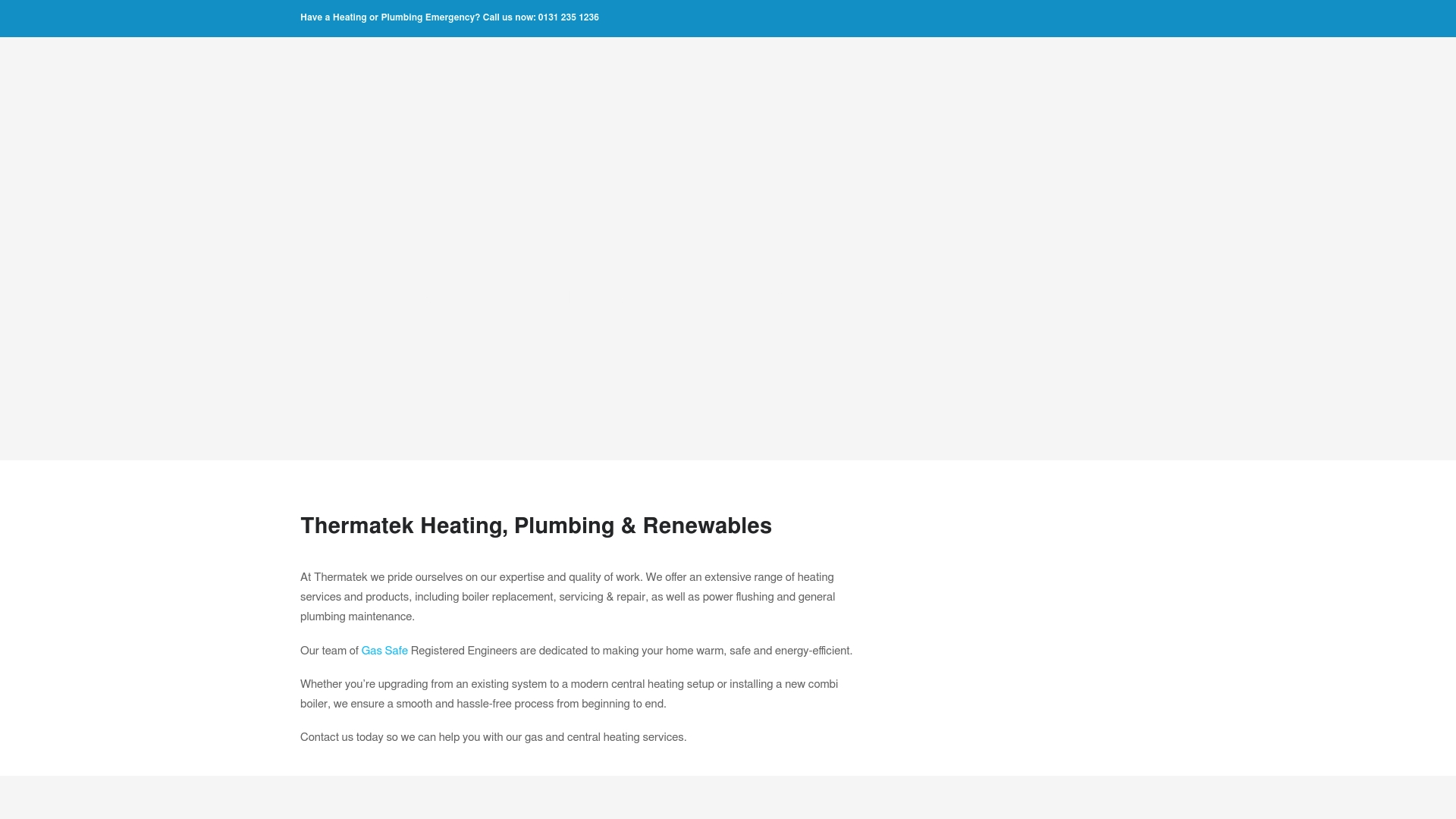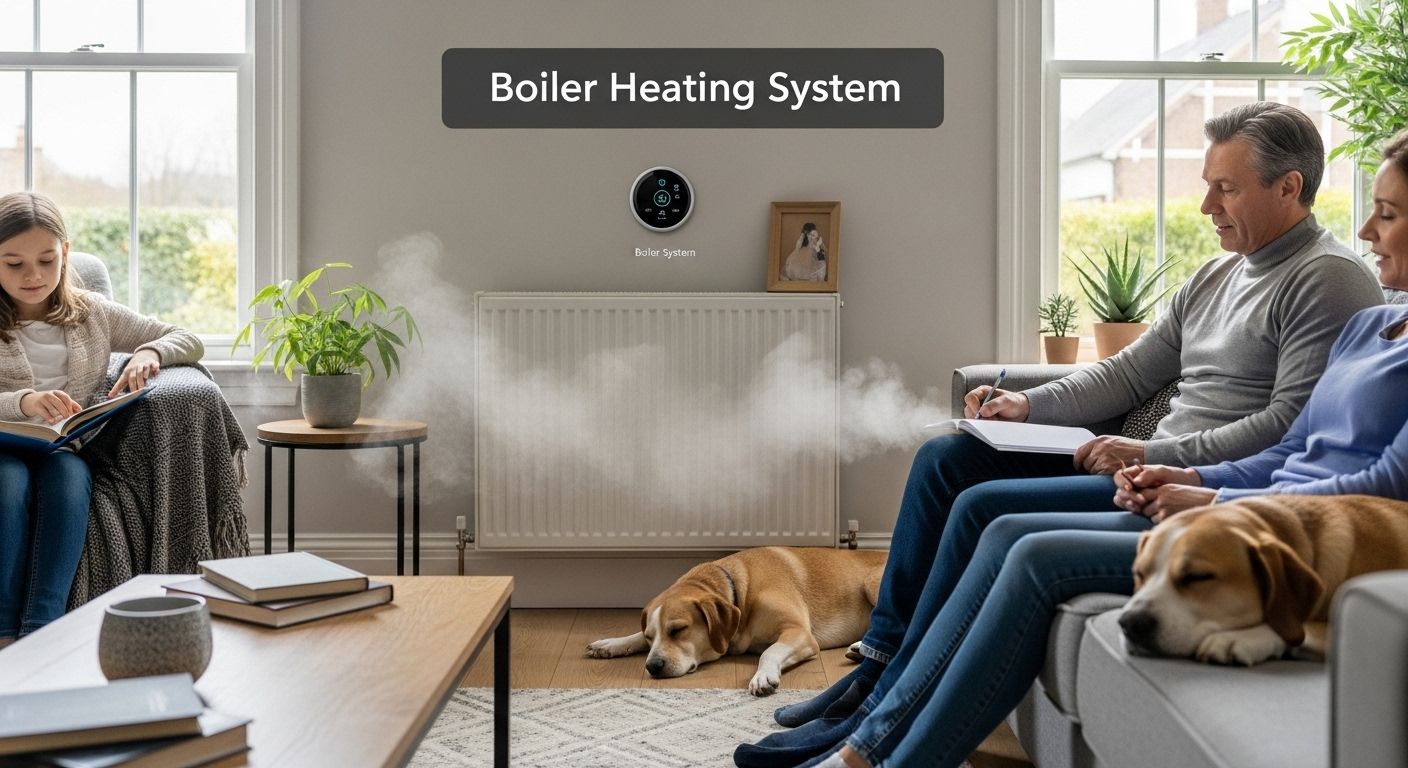Understanding the Boiler Heating System for House
Boiler heating systems quietly run the show in millions of British homes, generating a steady stream of warmth through winter’s chill. Yet while most people simply turn a dial and expect instant comfort, the real magic is happening behind the scenes. A modern condensing boiler can reach up to 90 percent energy efficiency, and that leaves old-fashioned systems looking utterly outdated.
Table of Contents
- What Is A Boiler Heating System And How Does It Work?
- Why A Boiler Heating System Matters For Your Home
- Key Components And Concepts Of Boiler Heating Systems
- Types Of Boiler Heating Systems And Their Applications
- Common Issues And Considerations For Boiler Maintenance
Quick Summary
| Takeaway | Explanation |
|---|---|
| Boiler systems ensure consistent heating. | They distribute heat evenly, eliminating cold spots and providing comfortable indoor temperatures throughout your home. |
| Regular maintenance prevents breakdowns. | Proactively managing your boiler can reduce repair costs and extend its operational lifespan significantly. |
| Choosing the right boiler impacts efficiency. | Selecting a design that matches your household’s needs directly influences energy consumption and operational costs. |
| Modern boilers offer environmental benefits. | Advanced technologies in contemporary boilers help lower energy use and reduce your carbon footprint. |
| Different boiler types serve varied needs. | Understanding diverse boiler configurations allows homeowners to choose the best fit for their home’s heating requirements. |
What is a Boiler Heating System and How Does It Work?
A boiler heating system is a fundamental residential heating solution that generates warmth by heating water or producing steam to distribute heat throughout a home. Unlike traditional heating methods, boilers create a comprehensive thermal network that efficiently transfers thermal energy across multiple rooms.
The Core Mechanism of Boiler Systems
At its essence, a boiler heating system operates through a sophisticated thermodynamic process. The system begins by heating water or generating steam within a central unit, typically powered by gas, electricity, or oil. Our comprehensive guide to boiler replacements provides deeper insights into these technological variations.
The fundamental stages of boiler operation include:
- Water or fluid is heated to a specific temperature within the primary chamber
- Heated water or steam circulates through radiators or underfloor heating pipes
- Heat is transferred from the water or steam into surrounding living spaces
- A return system captures cooled water and recirculates it for reheating
Types of Boiler Heating Technologies
Boiler systems are not uniform but represent diverse technological approaches. According to Energy Saving Trust, the primary boiler categories include:
- Combi boilers: Compact units providing instant hot water and heating
- System boilers: Featuring separate hot water storage cylinders
- Conventional boilers: Traditional designs with separate water tanks
Each design offers unique advantages depending on household size, energy requirements, and architectural configurations.

The selection determines overall heating efficiency, energy consumption, and long term operational costs. Modern boiler heating systems prioritize energy conservation, integrating smart technologies that optimise thermal management and reduce environmental impact.
Why a Boiler Heating System Matters for Your Home
Boiler heating systems represent more than just a method of warming your living space. They are sophisticated technological solutions that deliver comprehensive comfort, energy efficiency, and long term economic benefits for homeowners.
Comfort and Consistent Heating Performance
A well-designed boiler heating system ensures uniform warmth throughout your home. Unlike traditional heating methods that create temperature variations, boilers distribute heat evenly across rooms, eliminating cold spots and providing consistent thermal comfort. Our expert boiler replacement services can help optimise this critical home comfort feature.
Key advantages of boiler heating systems include:
- Precise temperature control
- Silent operation compared to forced air systems
- Reduced dust circulation
- Potential allergy and respiratory health benefits
Economic and Environmental Considerations
According to Energy Saving Trust, modern boiler systems can significantly reduce household energy consumption. The technological sophistication of contemporary boilers translates into direct financial savings and reduced carbon footprint.
The economic benefits extend beyond immediate energy savings:
- Lower long term operational costs
- Potential government energy efficiency incentives
- Increased property value through modern heating infrastructure
- Reduced maintenance requirements compared to older heating systems
By selecting an appropriate boiler heating system, homeowners invest in a reliable, efficient, and environmentally responsible home heating solution that balances personal comfort with broader sustainability goals.
Key Components and Concepts of Boiler Heating Systems
Boiler heating systems represent complex thermal engineering networks with interconnected components designed to efficiently generate and distribute heat throughout residential spaces. Understanding these components provides insight into the sophisticated mechanics behind modern home heating technologies.
Primary Boiler System Elements
The core components of a boiler heating system work in precise synchronisation to transform energy into usable thermal output. Our comprehensive boiler replacement guide offers deeper technical insights into these intricate systems.
Critical system components include:
- Heat exchanger: Transfers thermal energy between water and heating medium
- Burner: Generates initial heat through fuel combustion
- Circulating pump: Moves heated water through distribution networks
- Expansion tank: Manages water volume changes during heating cycles
- Control mechanisms: Regulate temperature and operational parameters
Thermal Distribution and Control Mechanisms
According to National Renewable Energy Laboratory, effective boiler systems integrate advanced control technologies that optimise energy transfer and consumption. These systems employ sophisticated thermostatic controls that continuously monitor and adjust heating performance.
Key control and distribution concepts include:
- Zoned heating capabilities
- Smart thermostat integration
- Predictive temperature management
- Automated efficiency protocols
By understanding these fundamental components, homeowners can appreciate the technological complexity underlying their heating infrastructure and make informed decisions about system maintenance, upgrades, and energy efficiency strategies.
Understanding the core components of a boiler system helps homeowners make informed decisions regarding maintenance and upgrades. The following table defines the major elements and their primary roles:
| Component | Function |
|---|---|
| Heat Exchanger | Transfers heat from the burner to the water |
| Burner | Generates heat through fuel combustion |
| Circulating Pump | Moves heated water around the distribution system |
| Expansion Tank | Accommodates water volume changes during heating cycles |
| Control Mechanisms | Regulate temperature and control system operation |
| Radiators/Underfloor | Distribute heat into living spaces |
| Thermostat | Monitors and adjusts temperature for comfort and efficiency |
Types of Boiler Heating Systems and Their Applications
Boiler heating systems encompass diverse technological approaches, each designed to meet specific residential heating requirements. Understanding these variations enables homeowners to select the most appropriate solution for their unique living environments.
Fuel-Based Boiler Classification
The primary categorisation of boiler systems stems from their fuel source and operational mechanisms. Our comprehensive heat pump installation services demonstrate the evolving landscape of residential heating technologies.
Boiler systems can be classified based on fuel types:
- Gas boilers: Most common, utilising natural gas for heating
- Oil boilers: Traditional systems using heating oil
- Electric boilers: Emerging technology with zero direct emissions
- Biomass boilers: Sustainable options using organic materials
Thermal Delivery and Design Configurations
According to National Institutes of Health research, modern boiler systems increasingly prioritise environmental sustainability and energy efficiency. The thermal delivery methodology significantly influences system performance and residential comfort.
Key boiler system design configurations include:
- Combi boilers: Compact units providing instant hot water and heating
- System boilers: Featuring separate hot water storage cylinders
- Conventional boilers: Traditional designs with separate water tanks
- Condensing boilers: Advanced technology capturing waste heat for improved efficiency
Each configuration offers distinct advantages, enabling homeowners to balance performance, space requirements, and energy consumption based on their specific household needs.

Common Issues and Considerations for Boiler Maintenance
Boiler maintenance represents a critical aspect of ensuring long term system performance, energy efficiency, and household safety. Proactive management prevents costly repairs and extends the operational lifespan of heating infrastructure.
Critical Diagnostic Indicators
Homeowners must remain vigilant about recognising potential system irregularities. Our comprehensive boiler replacement services can help address complex maintenance challenges before they escalate.
Key warning signs requiring immediate attention include:
- Unusual noises during heating cycles
- Inconsistent water temperature
- Visible water leakage
- Increased energy consumption
- Persistent pilot light issues
Preventative Maintenance Strategies
According to U.S. Department of Energy research, systematic maintenance significantly improves boiler reliability and operational efficiency. Professional interventions can mitigate potential system failures and optimise thermal performance.
Essential maintenance considerations include:
- Annual professional inspection
- Regular cleaning of heat exchanger surfaces
- Checking and replacing safety valves
- Monitoring system pressure levels
- Assessing combustion efficiency
By implementing comprehensive maintenance protocols, homeowners protect their heating investment and ensure consistent, safe thermal comfort throughout their living spaces.
Upgrade Your Comfort and Efficiency with Professional Boiler Solutions
If you are frustrated by uneven heating, rising energy bills or the worry of an unreliable boiler system, you do not have to face these issues alone. Your home deserves a heating system that delivers both comfort and efficiency. As highlighted in our article, the right boiler setup enables precise temperature control, energy savings and healthier living. It is essential to trust experienced professionals for services like boiler replacement, annual servicing and reliable repairs. This is the best way to protect your investment and keep your home comfortable all year round.

Take control of your home’s warmth and safety today. Visit thermatekheating.co.uk to explore our full range of accredited heating solutions, request a free quote or get expert advice from our Gas Safe engineers. Make the switch to a dependable heating partner now, and experience the difference a professional touch brings.
Frequently Asked Questions
What are the main components of a boiler heating system?
The primary components of a boiler heating system include the heat exchanger, burner, circulating pump, expansion tank, and control mechanisms. These parts work together to heat water, distribute it, and manage the heating process efficiently.
How does a boiler heating system differ from traditional heating methods?
Unlike traditional heating methods that can create temperature variations, boiler heating systems provide uniform warmth throughout the home by circulating heated water or steam through radiators or underfloor pipes, ensuring consistent comfort.
What types of boilers are available for home heating?
Boiler systems can be categorized primarily into combi boilers, system boilers, conventional boilers, gas boilers, oil boilers, electric boilers, and biomass boilers. Each type has unique features and advantages tailored to different household needs and preferences.
To help you compare the main types of boilers available for home heating, the following table summarises their key characteristics and suitability:
| Boiler Type | Key Features | Best For |
|---|---|---|
| Combi Boiler | Compact, provides instant hot water and heating | Smaller homes, limited space |
| System Boiler | Separate hot water storage cylinder, good flow rate | Medium to large homes, multiple bathrooms |
| Conventional Boiler | Traditional, uses separate water tank and cylinder | Older homes, high hot water demand |
| Gas Boiler | Runs on natural gas, widely available | Most UK homes, efficient for many sizes |
| Oil Boiler | Uses heating oil, traditional for off-grid homes | Properties without gas supply |
| Electric Boiler | Runs on electricity, zero direct emissions | Small flats, properties without gas |
| Biomass Boiler | Uses organic material as fuel, eco-friendly option | Eco-conscious homeowners, rural areas |
What are common issues that may arise with boiler systems?
Common issues with boiler systems include unusual noises during operation, inconsistent water temperature, visible leaks, increased energy consumption, and pilot light problems. Addressing these signs promptly can prevent more significant issues and maintain system efficiency.

